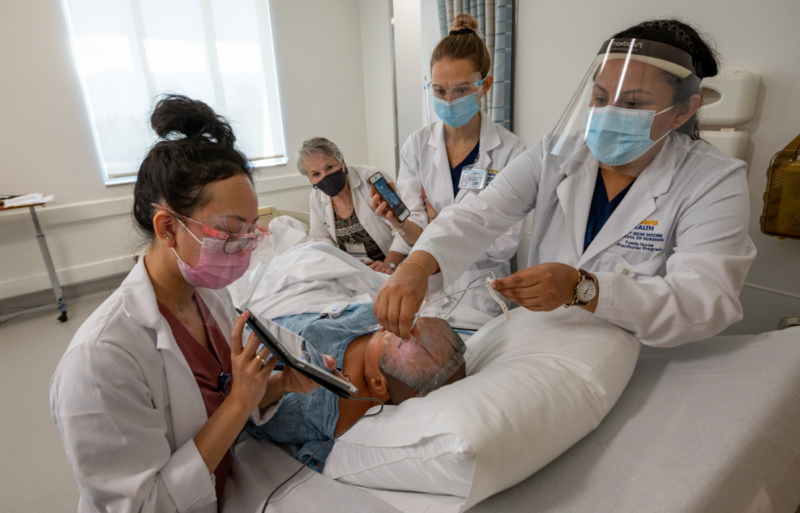Family Nurse Practitioners (FNPs), making up 69.7% of certified nurse practitioners, play a critical role in our healthcare system. They are primary care providers, offering expertise encompassing clinical acumen and empathetic patient engagement.
FNPs are educated to employ a multifaceted approach, incorporating proactive prevention, patient-centered care, chronic disease management, and comprehensive care across the lifespan. They also prioritize patient education, effective coordination of care, emotional and mental health support, and innovative telehealth utilization.
These eight strategies, which this article delves into, are the pillars of the FNP practice, contributing significantly to improved patient outcomes. In this light, we aim to underscore the vital importance of FNPs in delivering high-quality healthcare and enhancing patient well-being.
The Importance of Education in Family Nurse Practice

The effectiveness of an FNP is fundamentally rooted in rigorous academic and practical training. Education covers a broad spectrum of subjects, including but not limited to anatomy, physiology, pharmacology, and advanced clinical assessment.
This rich blend of coursework, supplemented with hands-on clinical experiences, equips FNPs with a comprehensive understanding of diverse medical conditions, their diagnosis, and treatment procedures.
This in-depth knowledge empowers them to provide competent care, make informed decisions, and devise effective treatment plans. As a result, patient outcomes improve significantly. In light of this, it becomes clear why obtaining high-quality education, often through programs like online MSN programs, is essential for FNPs to excel in their roles.
Here are eight ways FNPs can ensure better patient outcomes:
Proactive Prevention Measures
FNPs place a strong emphasis on preventive care. They go beyond treating acute illnesses and focus on advocating for healthy lifestyle changes to prevent diseases at their earliest stages. FNPs actively promote regular health screenings, encouraging patients to undergo necessary tests and screenings to detect potential health issues early on.
By ensuring timely vaccinations and counseling patients on preventive measures such as ways to quit smoking, weight management, and stress reduction, FNPs reduce the occurrence and severity of various illnesses. This proactive approach prevents disease progression and promotes overall wellness, leading to improved patient outcomes.
Patient-Centered Approach

FNPs deliver care that is tailored to the unique needs of each patient. When developing care plans, they consider the individual’s physical, mental, and social circumstances. By taking a patient-centered approach, FNPs establish a strong rapport with their patients, actively involving them in their care decisions.
They listen attentively to patients’ concerns, preferences, and goals, ensuring that treatment plans align with their values and lifestyles. This personalized approach fosters trust and collaboration between the patient and the FNP, which enhances treatment effectiveness, promotes adherence to therapies, and contributes to better patient outcomes.
Chronic Disease Management
The management of chronic diseases is another area where FNPs excel. They provide ongoing care for patients with long-term illnesses, closely monitoring their health and adjusting treatment plans as necessary.
FNPs work collaboratively with patients to develop comprehensive chronic disease management plans that include medication adherence, lifestyle modifications, and regular monitoring of symptoms.
They also educate patients about their conditions, empowering them to recognize early warning signs and take proactive steps to prevent exacerbations. By effectively managing chronic conditions, FNPs help reduce the frequency and severity of complications, ultimately improving patients’ quality of life and overall health outcomes.
Comprehensive Care For All Ages
FNPs are trained to care for patients of all ages, from infants to the elderly. Their expertise in age-specific health concerns allows them to treat diverse patient populations appropriately and effectively.
Whether assessing developmental milestones in children, providing reproductive health counseling to adolescents, or managing age-related conditions in older adults, FNPs ensure comprehensive care for all. They recognize patients’ unique challenges and vulnerabilities at different stages of life and tailor their interventions accordingly.
Health Education and Counselling

FNPs play an instrumental role in educating patients about their health. They provide valuable health education and counsel patients on disease management, medication use, and lifestyle modifications.
FNPs take the time to explain complex medical concepts in understandable terms, ensuring patients have a clear understanding of their conditions and treatment plans. They empower patients to actively participate in their care by teaching self-care techniques, promoting healthy behaviors, and addressing misconceptions or fears.
By equipping patients with knowledge and skills, FNPs facilitate informed decision-making, enhance treatment compliance, and promote better patient outcomes.
Coordination of Care
The role of FNPs extends to the coordination of care among different healthcare providers. They act as a bridge between patients and other specialists involved in their care, ensuring seamless communication and collaboration.
FNPs proactively coordinate care, facilitate effective communication, and share information between healthcare professionals. They participate in interdisciplinary meetings, contribute to care conferences, and advocate for their patient’s needs and preferences.
This comprehensive and integrated approach leads to more efficient treatment plans, reduced medical errors, and improved patient outcomes. FNPs ensure that patients receive timely and appropriate interventions, benefiting from a well-coordinated continuum of care.
Emotional and Mental Health Support
FNPs recognize the importance of addressing mental and emotional health alongside physical health. They acknowledge that emotional well-being significantly impacts overall health outcomes. FNPs are trained to assess and manage common mental health concerns like anxiety, depression, and stress.
They provide empathetic listening, offer guidance, and employ evidence-based interventions to support patients’ emotional well-being. By addressing mental health concerns and providing emotional support, FNPs contribute to the holistic well-being of their patients.
Utilization of Telehealth

The use of telehealth services is another way FNPs can improve patient outcomes. By providing remote consultations and follow-ups, they can ensure accessibility and continuity of care. Telehealth platforms allow FNPs to connect with patients in real time, regardless of geographical barriers.
This enables patients to receive timely advice, diagnosis, and treatment recommendations without needing in-person visits. Telehealth not only enhances patient convenience and compliance but also improves health outcomes.
It allows FNPs to monitor patients remotely, manage chronic conditions, and provide necessary support and guidance, ultimately contributing to better patient outcomes.
Conclusion
FNPs significantly improve patient outcomes with their commitment to education, patient-centered care, chronic disease management, lifespan care, health education, care coordination, and mental health support.
Their approach to healthcare, marked by a unique blend of competence and compassion, makes a considerable difference in patient well-being.
Whether you’re a patient, healthcare provider, or policymaker, it’s time to acknowledge and elevate the role of FNPs. Advocate for their profession, appreciate their efforts, and spread the word about their invaluable work to ensure a healthier future for all.

